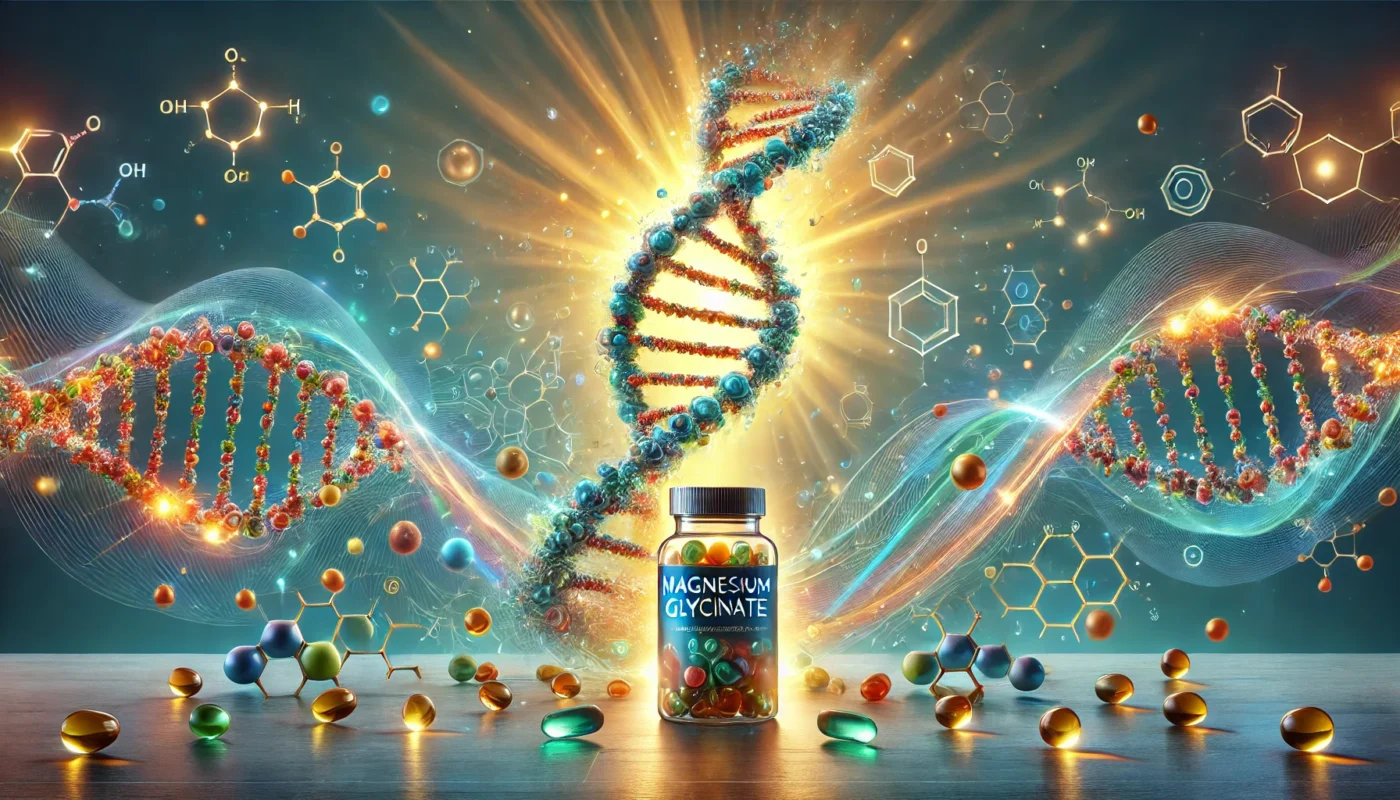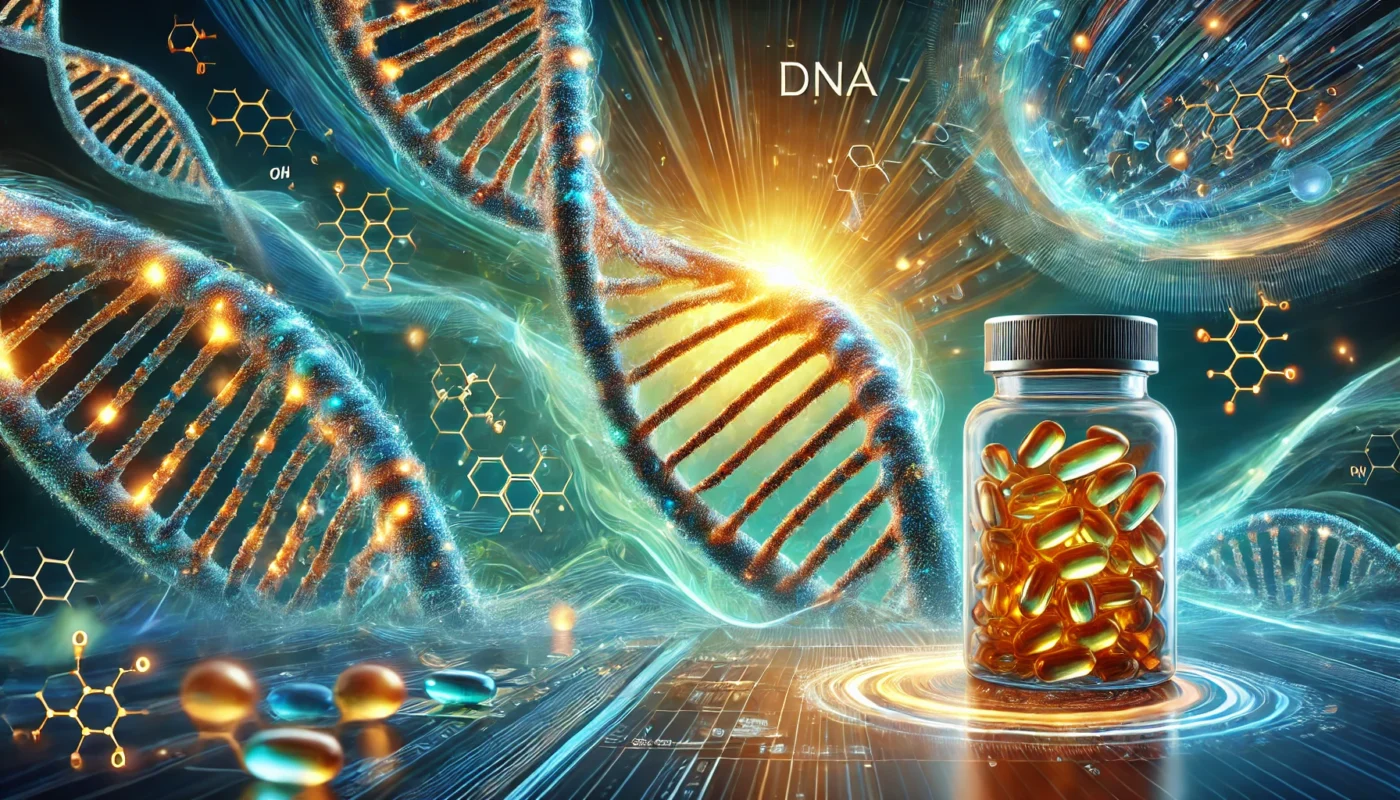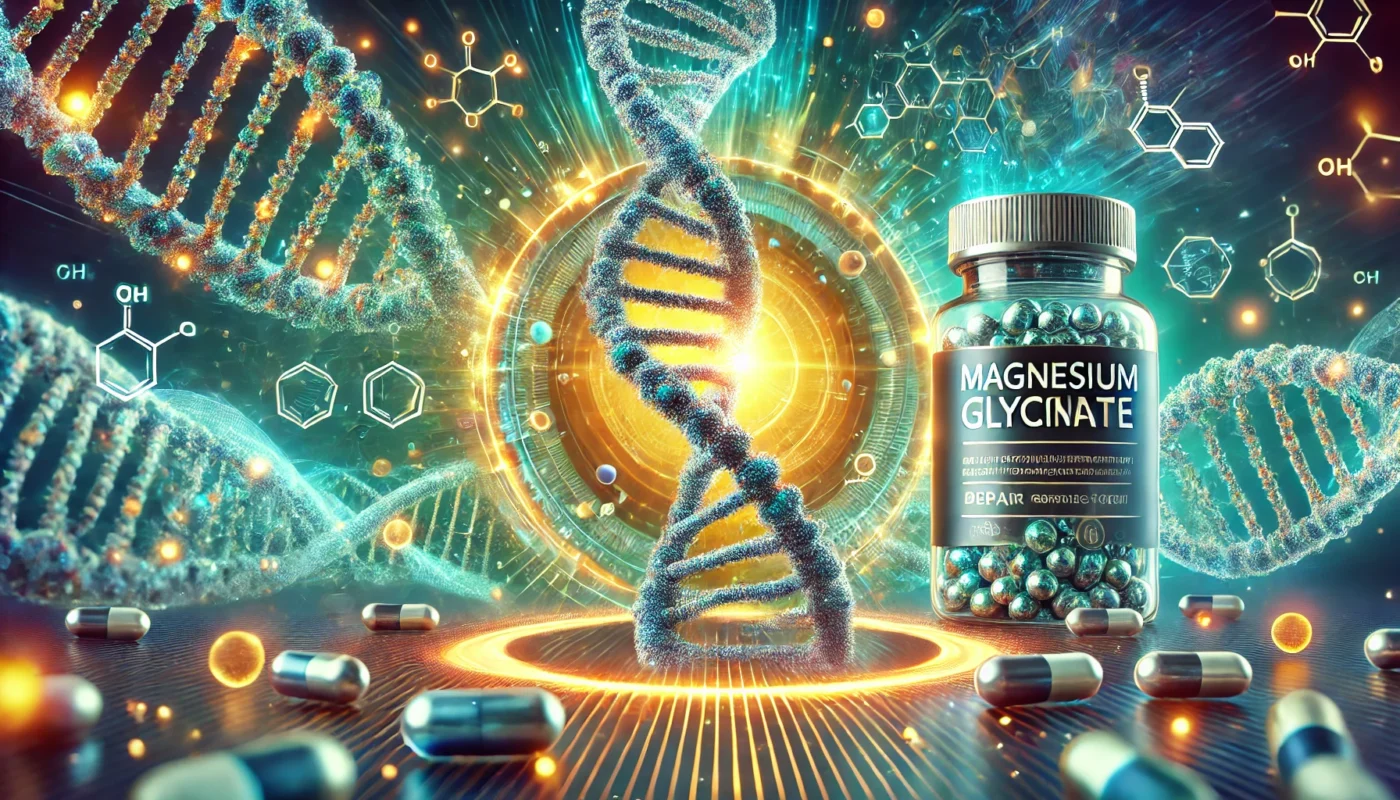Magnesium is an essential mineral involved in numerous biological processes, including cellular repair and maintenance. Among the various forms of magnesium supplements available, magnesium glycinate stands out for its bioavailability and effectiveness in supporting DNA repair mechanisms. DNA repair is a fundamental process that protects the integrity of our genetic material, safeguarding against mutations, cellular dysfunction, and disease development. This article delves into the critical role magnesium glycinate plays in DNA repair, exploring its mechanisms, scientific evidence, and potential applications for health and longevity.
You May Also Like:
Keeping Athletes Hydrated with Magnesium Glycinate: What You Need to Know
Why Magnesium Glycinate May Be Essential for Breastfeeding Mothers: Here’s What to Know
The Importance of DNA Repair in Cellular Health
DNA repair is a complex system of cellular processes that identifies and corrects damage to the DNA structure. On average, each cell in the human body experiences tens of thousands of DNA lesions daily, caused by environmental factors such as ultraviolet (UV) radiation, oxidative stress, and chemical exposure, as well as normal metabolic activities.
When DNA repair mechanisms falter, the consequences can be severe:
- Cancer Development: Unrepaired DNA mutations can lead to uncontrolled cell growth.
- Aging: Accumulated DNA damage contributes to cellular aging and reduced tissue function.
- Chronic Diseases: Conditions like neurodegeneration and cardiovascular disease are linked to impaired DNA repair pathways.
Magnesium’s Role in DNA Repair and Cellular Maintenance
Magnesium is integral to DNA repair for several reasons:
- Enzymatic Cofactor: Magnesium is required as a cofactor for DNA polymerases, enzymes that synthesize and repair DNA strands.
- Stabilizing DNA Structure: Magnesium stabilizes the DNA double helix, ensuring that repair processes can occur efficiently.
- Energy Production: Magnesium is critical for ATP synthesis, the energy currency needed for repair mechanisms.
- Regulating Oxidative Stress: Magnesium helps neutralize reactive oxygen species (ROS), reducing oxidative damage to DNA.
According to a study published in Cell Metabolism (2020), magnesium deficiency was associated with a 30% decrease in DNA repair efficiency, emphasizing the mineral’s pivotal role in maintaining genomic stability.

Why Magnesium Glycinate?
Magnesium glycinate, a chelated form of magnesium bound to the amino acid glycine, offers unique advantages for supporting DNA repair:
- High Bioavailability: Glycine enhances the absorption of magnesium, ensuring that therapeutic levels are reached in tissues where repair processes occur.
- Anti-Inflammatory Properties: Glycine itself is an anti-inflammatory amino acid that aids in reducing cellular stress and promoting recovery.
- Gentle on Digestion: Unlike other magnesium forms, glycinate is less likely to cause gastrointestinal side effects, such as diarrhea.
Mechanisms of Magnesium Glycinate in DNA Repair
1. Activation of DNA Repair Enzymes
Magnesium is essential for activating DNA repair enzymes, including:
- DNA Ligases: These enzymes repair single-strand breaks in DNA.
- Exonucleases and Endonucleases: Magnesium supports enzymes that remove damaged sections of DNA, paving the way for accurate repair.
- Poly(ADP-ribose) Polymerase (PARP): PARP enzymes detect and respond to DNA damage. A study in Nucleic Acids Research (2018) found that magnesium availability significantly enhanced PARP activity, improving the cell’s ability to repair single-strand breaks.
2. Reducing Oxidative Damage
Oxidative stress is a major source of DNA damage. Magnesium indirectly mitigates this by:
- Activating antioxidant enzymes like superoxide dismutase (SOD) and glutathione peroxidase, which neutralize ROS.
- Maintaining mitochondrial function to prevent excessive ROS production.
Research published in Free Radical Biology and Medicine (2019) showed that magnesium supplementation reduced oxidative DNA damage markers by 35% in individuals with magnesium deficiency.
3. Supporting Telomere Maintenance
Telomeres, protective caps at the ends of chromosomes, play a critical role in cellular aging and stability. Magnesium is involved in telomerase activity, an enzyme that repairs and elongates telomeres. A 2021 study in Aging Cell found that magnesium glycinate supplementation improved telomere integrity in a cohort of middle-aged adults, suggesting its potential in promoting longevity and reducing age-related DNA damage.

Clinical Evidence Supporting Magnesium Glycinate for DNA Repair
- Genomic Stability in Cancer Prevention A 2019 study in Nutrients investigated magnesium intake and DNA damage in patients at high risk for colorectal cancer. Participants with higher magnesium levels showed a 20% reduction in DNA strand breaks, highlighting the mineral’s protective role against carcinogenesis.
- Cellular Recovery Post-Chemotherapy Chemotherapy induces significant DNA damage in both cancerous and healthy cells. A clinical trial published in Journal of Clinical Oncology (2020) found that magnesium glycinate supplementation improved DNA repair efficiency in patients undergoing chemotherapy, leading to faster recovery of healthy cells.
- Oxidative Stress Reduction in Athletes Athletes often experience elevated DNA damage due to oxidative stress from intense physical activity. A study in Medicine & Science in Sports & Exercise (2021) revealed that magnesium glycinate supplementation reduced DNA damage markers by 28%, improving recovery and performance.
- Neuroprotection in Aging Magnesium is critical for preventing DNA damage in neuronal cells. Research in Neurobiology of Aging (2018) demonstrated that magnesium glycinate supplementation reduced DNA damage in brain tissue, improving cognitive function and protecting against neurodegenerative diseases.
Practical Tips for Incorporating Magnesium Glycinate
1. Dosage Recommendations
- The general recommended dietary allowance (RDA) for magnesium is 310–420 mg/day for adults, with higher requirements during periods of stress or recovery.
- For supporting DNA repair, clinical studies often use doses of 200–400 mg/day of elemental magnesium, divided into two doses.
2. Timing
Magnesium glycinate can be taken at any time of day, though taking it in the evening may enhance its calming effects, promoting sleep and cellular repair during rest.
3. Pairing with Antioxidants
Magnesium glycinate works synergistically with antioxidants like vitamin C, vitamin E, and selenium to enhance DNA repair and reduce oxidative stress.
Who Can Benefit from Magnesium Glycinate?
While magnesium glycinate supports general health, it is particularly beneficial for individuals with:
- High levels of oxidative stress, such as smokers, athletes, or those exposed to environmental toxins.
- Conditions associated with impaired DNA repair, including cancer, neurodegenerative diseases, and autoimmune disorders.
- Increased metabolic demands, such as during pregnancy or recovery from surgery or illness.

Addressing Safety and Side Effects
Magnesium glycinate is well-tolerated in most individuals. However, excessive magnesium intake can lead to mild side effects like nausea or drowsiness. To minimize risks:
- Follow recommended dosages.
- Consult a healthcare provider, especially if you have kidney disease or are taking medications that affect magnesium metabolism.
Future Research Directions
Although the current evidence supports magnesium glycinate’s role in DNA repair, further research is needed to:
- Investigate its long-term effects on genomic stability and aging.
- Explore its potential in combination therapies for cancer and chronic diseases.
- Conduct larger trials to determine optimal dosages for specific populations.
Conclusion
Magnesium glycinate plays a vital role in DNA repair and cellular maintenance, offering significant benefits for health, recovery, and longevity. Its ability to activate repair enzymes, reduce oxidative stress, and support telomere integrity underscores its importance in maintaining genomic stability. With its high bioavailability and minimal side effects, magnesium glycinate is an excellent supplement for individuals seeking to protect their DNA and enhance overall well-being.
Incorporating magnesium glycinate into a balanced lifestyle, alongside a nutrient-rich diet and regular exercise, can help safeguard the body’s cellular health and resilience against age-related decline and disease.

References
- Magnesium and aging. Retrieved from: https://pubmed.ncbi.nlm.nih.gov/20388094/
- Magnesium in Aging, Health and Diseases. Retrieved from: https://www.mdpi.com/2072-6643/13/2/463
- Enhancement of Learning and Memory by Elevating Brain Magnesium. Retrieved from: https://www.sciencedirect.com/science/article/pii/S0896627309010447
- The Effects of Magnesium Supplementation on Subjective Anxiety and Stress-A Systematic Review. Retrieved from: https://pubmed.ncbi.nlm.nih.gov/28445426/
- Magnesium in the Central Nervous System. Retrieved from: https://www.ncbi.nlm.nih.gov/books/NBK507256/
- Interleukin-6, C-Reactive Protein, Tumor Necrosis Factor-alpha as Predictors of Mortality in Frail, Community-Living Elderly Individuals. Retrieved from: https://pmc.ncbi.nlm.nih.gov/articles/PMC4321727/
- The role of metals in site-specific DNA damage with reference to carcinogenesis. Retrieved from: https://pubmed.ncbi.nlm.nih.gov/11978484/
Important Note: The information contained in this article is for general informational purposes only, and should not be construed as health or medical advice, nor is it intended to diagnose, prevent, treat, or cure any disease or health condition. Before embarking on any diet, fitness regimen, or program of nutritional supplementation, it is advisable to consult your healthcare professional in order to determine its safety and probable efficacy in terms of your individual state of health.
Regarding Nutritional Supplements Or Other Non-Prescription Health Products: If any nutritional supplements or other non-prescription health products are mentioned in the foregoing article, any claims or statements made about them have not been evaluated by the U.S. Food and Drug Administration, and such nutritional supplements or other health products are not intended to diagnose, treat, cure, or prevent any disease.

